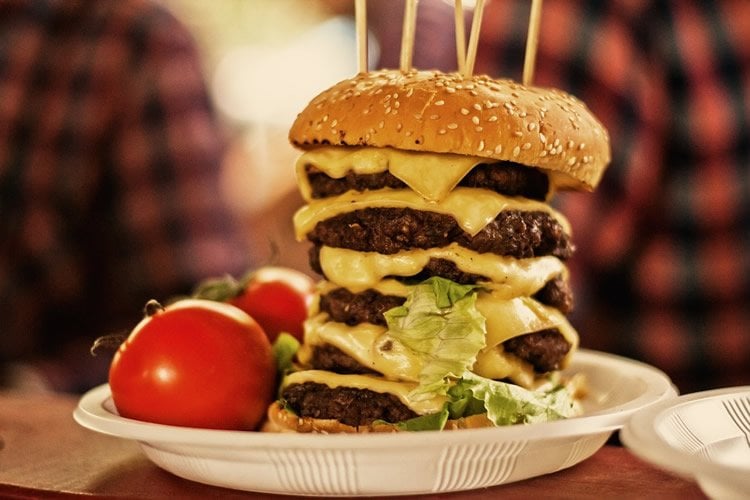Summary: Researchers say dietary fats, not sugars or proteins, are the only cause of weight gain.
Source: University of Aberdeen.
Scientists from the University of Aberdeen and the Chinese Academy of Sciences have undertaken the largest study of its kind looking at what components of diet – fat, carbohydrates or protein – caused mice to gain weight.
Since food consists of fat, protein and carbs, it has proven difficult to pinpoint exactly what aspect of the typical diet leads to weight gain.
Part of the problem is that it is very difficult to do studies on humans where what they eat is controlled for long enough periods to work out what are the most important factors, however studies on animals that are similar to us can help point in the right direction.
The study was published in the journal Cell Metabolism and includes 30 different diets that vary in their fat, carbohydrate (sugar) and protein contents.
The mice were fed these diets for three months, which is equivalent to nine years in humans. In total over 100,000 measurements were made of body weight changes and their body fat was measured using a micro MRI machine.
Professor John Speakman, who led the study, said: “The result of this enormous study was unequivocal – the only thing that made the mice get fat was eating more fat in their diets.

“Carbohydrates including up to 30% of calories coming from sugar had no effect. Combining sugar with fat had no more impact than fat alone. There was no evidence that low protein (down to 5%) stimulated greater intake, suggesting there is no protein target. These effects of dietary fat seemed to be because uniquely fat in the diet stimulated the reward centres in the brain, stimulating greater intake.
“A clear limitation of this study is that it is based on mice rather than humans. However, mice have lots of similarities to humans in their physiology and metabolism, and we are never going to do studies where the diets of humans are controlled in the same way for such long periods. So the evidence it provides is a good clue to what the effects of different diets are likely to be in humans.”
Source: Laura Graham – University of Aberdeen
Publisher: Organized by NeuroscienceNews.com.
Image Source: NeuroscienceNews.com image is in the public domain.
Original Research: Abstract for “Dietary Fat, but Not Protein or Carbohydrate, Regulates Energy Intake and Causes Adiposity in Mice” by Sumei Hu, Lu Wang, Dengbao Yang, Li Li, Jacques Togo, Yingga Wu7, Quansheng Liu, Baoguo Li, Min Li, Guanlin Wang, Xueying Zhang, Chaoqun Niu, Jianbo Li, Yanchao Xu, Elspeth Couper, Andrew Whittington-Davies, Mohsen Mazidi, Lijuan Luo, Shengnan Wang, Alex Douglas, and John R. Speakman in Cell Metabolism. Published July 12 2018.
doi:10.1016/j.cmet.2018.06.010
[cbtabs][cbtab title=”MLA”]University of Aberdeen”Fat Consumption is the Only Cause of Weight Gain.” NeuroscienceNews. NeuroscienceNews, 14 July 2018.
<https://neurosciencenews.com/fat-consumption-weight-gain-9573/>.[/cbtab][cbtab title=”APA”]University of Aberdeen(2018, July 14). Fat Consumption is the Only Cause of Weight Gain. NeuroscienceNews. Retrieved July 14, 2018 from https://neurosciencenews.com/fat-consumption-weight-gain-9573/[/cbtab][cbtab title=”Chicago”]University of Aberdeen”Fat Consumption is the Only Cause of Weight Gain.” https://neurosciencenews.com/fat-consumption-weight-gain-9573/ (accessed July 14, 2018).[/cbtab][/cbtabs]
Abstract
Dietary Fat, but Not Protein or Carbohydrate, Regulates Energy Intake and Causes Adiposity in Mice
Highlights
•Energy intake was linked only to dietary fat levels and not protein or sucrose
•Adiposity increased with increasing fat content to 60% but thereafter declined
•Hypothalamic hunger pathways were unresponsive to dietary protein content
•Dopamine, opioid, and serotonin pathways were all stimulated by fat intake
Summary
The impacts of different macronutrients on body weight regulation remain unresolved, with different studies suggesting increased dietary fat, increased carbohydrates (particularly sugars), or reduced protein may all stimulate overconsumption and drive obesity. We exposed C57BL/6 mice to 29 different diets varying from 8.3% to 80% fat, 10% to 80% carbohydrate, 5% to 30% protein, and 5% to 30% sucrose. Only increased dietary fat content was associated with elevated energy intake and adiposity. This response was associated with increased gene expression in the 5-HT receptors, and the dopamine and opioid signaling pathways in the hypothalamus. We replicated the core findings in four other mouse strains (DBA/2, BALB/c, FVB, and C3H). Mice regulate their food consumption primarily to meet an energy rather than a protein target, but this system can be over-ridden by hedonic factors linked to fat, but not sucrose, consumption.







